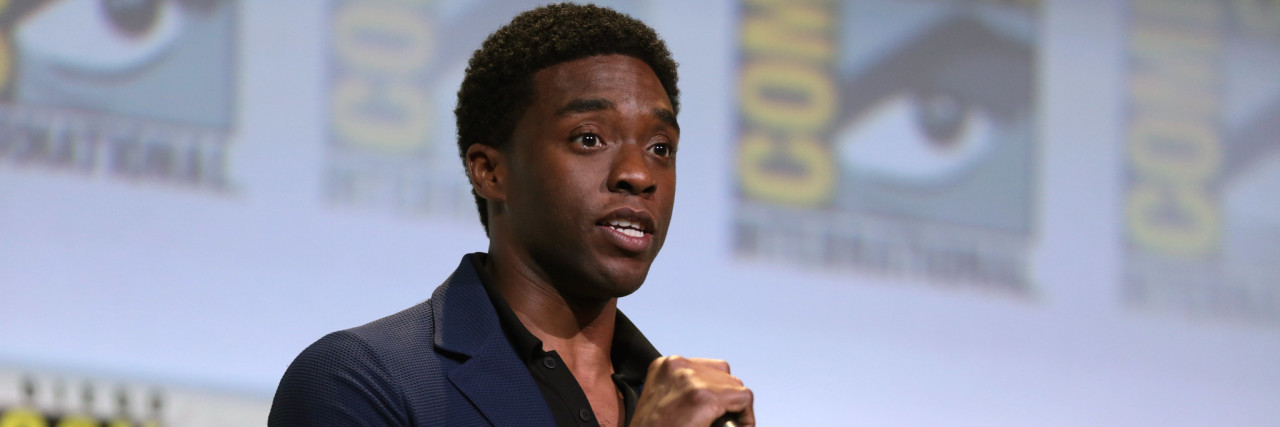Dear Entertainment Industry, Please Learn From Chadwick Boseman
Dear Entertainment Industry:
I see you mourning Chadwick Boseman — as you should, because he was an incredible man. But I’ve seen so many say, “He didn’t want to trouble us with his cancer because he was such a caretaker.” That’s a paraphrase, of course, and it’s meant to be a loving tribute to the man. But as someone who deliberately chose to leave the entertainment industry due to its inaccessibility and discrimination against disabled people, I cannot ignore the dark side of that statement.
Chadwick Boseman, a phenomenal man and actor who was absolutely deserving of the opportunities he got, likely would not have been cast if people knew he had cancer. There. I said it. Can you imagine a Marvel executive saying, “I don’t care that this person has cancer and we’d have to fix the plot to accommodate his chemo/off-days/possible death?” Or a casting director saying, “I know he’s in chemo, but he says he can still play baseball, so he’ll be Jackie Robinson?” Do you really believe producers and directors would have given him the time of day if they knew he was sick?
Truth is, this isn’t just a Hollywood issue. It’s an entertainment industry issue. My best friend growing up had congenital heart disease. Although she was able, she was denied roles that she was well-qualified for in her ballet studio. She quit dance at age 14 because she realized if her studio didn’t give her a chance, the Rockettes never would. Another friend sustained a traumatic brain injury (TBI) during his senior year of high school. He’s now a make-up designer and worked on some directing teams at his college and has played cameo roles in his hometown, but the odds of him being hired outside of home and school are minimal — and believe me when I say he’s so talented that anyone who overlooks him is a fool.
When I mentioned my hearing loss to a teacher in high school, she stopped casting me, even though I was given better opportunities elsewhere (and where I was disability-closeted). I strongly suspect I wasn’t cast for a specific show in college because the director’s casting assistant knew I was sick. Instead, I became a director and costume designer. I actually was a better director and designer than an actor, but I knew my odds of professional success weren’t great. A Google search of disabled theatrical directors is practically fruitless. I’m confident they exist, but very few are willing to invite discrimination into their life.
Opportunities for actors aren’t much better. Ali Stroker, a phenomenal, wheelchair-using performer, is the first wheelchair user on Broadway — even though “Wicked” and “Newsies,” which opened 17 and 18 years ago, respectively, both feature disabled characters. One has a wheelchair user, and the other features a character with a limp. And how often are disabled characters played by able-bodied actors? And how often is a disabled actor cast as, well, a person with a story unrelated to disability? Why can’t James Bond be played by an actor with multiple sclerosis — or why can’t that movie have a disabled person on the creative team? Why can’t a superhero be played by a person who openly says that they have cancer?
Now, I want to make it perfectly clear that Chadwick Boseman is and was entitled to his privacy. I don’t know his reasons for keeping his cancer a secret, but it is a choice I empathize with a lot. But as the entertainment industry mourns a bright star, it will not mourn the thousands of disabled creatives who may be equally talented but who will not be given a chance because of their disability.
Perhaps it wasn’t that Chadwick “didn’t want to trouble you.” Perhaps he just wanted to be given a shot.
Dear Entertainment Industry, I have a challenge for you: Remember Chadwick Boseman. He became an icon for Black culture and American culture through iconic roles like Thurgood Marshall, James Brown, Jackie Robinson, and T’Challa. He did all that while battling cancer. Honor his memory by deliberately looking for marginalized voices so that the next person doesn’t have to obscure part of themselves to be given an equal chance.

